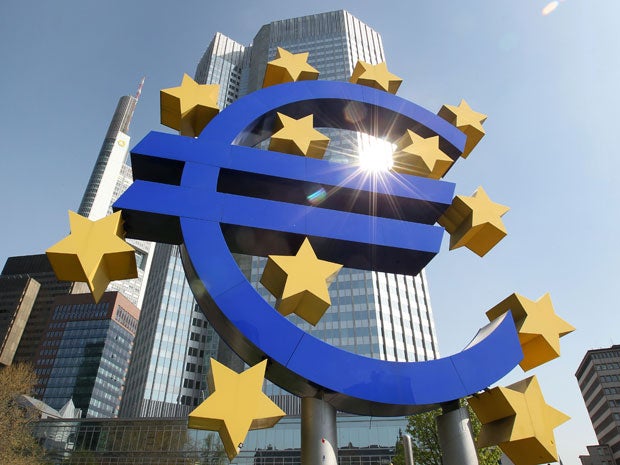A lifeboat of emergency measures was launched by European policymakers today in a bid to rescue the sinking eurozone.
As well as slashing interest rates for the second time in five weeks, to 1% from 1.25%, European Central Bank (ECB) president Mario Draghi announced more lenient terms on loans to ease financial pressure on struggling banks.
The move came shortly after the Bank of England decided to hold interest rates at historic lows of 0.5% and maintain its level of quantitative easing - effectively money printing - at £275 billion.
Mr Draghi, who has overseen the complete reversal of what now appear to be two ill-timed rate hikes under his predecessor, Jean-Claude Trichet, also unveiled additional measures to boost money market activity.
He said: "The intensified financial market tensions are continuing to dampen economic activity in the euro area and the outlook remains subject to high uncertainty and substantial downside risks."
The ECB move comes as leaders prepare for a crucial summit in Brussels tomorrow, at which France and Germany are expected to call for a raft of new financial measures to bring about tighter fiscal union in the 17-nation eurozone.
The moves are designed to bolster financial stability in the region and find a way out of the sovereign debt crisis which has brought a number of economies to the brink of collapse.
The ECB's decision to cut rates and ease pressure on banks will be aimed at tackling the underlying problems in the eurozone - that is, weak growth, low confidence and a lack of credit.
Purchasing Managers' Index data suggest the eurozone is likely to contract by 0.5% in the fourth quarter, while price pressures look set to ease in the coming months.
Chris Williamson, chief economist at financial information services firm Markit, said: "The sovereign debt crisis has hit business and consumer confidence at the same time as austerity measures are dampening demand in many countries."
He added: "The data suggest that the ECB is correct to be more worried about stabilising the economy, helping restore confidence and fighting off deflationary forces rather than future inflation."
In the UK, the Bank of England left its own monetary policy unchanged. It has already acknowledged that it will take until February to administer the £75 billion expansion in its QE programme announced in October.
Howard Archer, chief UK and European economist at IHS Global Insight, expects a further £50 billion of QE from the Bank of England in both the first and second quarters of 2012, taking the total up to £375 billion.
He said: "Despite keeping policy on hold this month, latest data and survey evidence are likely to have largely reinforced the MPC's concerns over the economy and fuelled their belief that more QE will be required."
The latest snapshot of the UK economy has made for gloomy reading, with influential think-tank NIESR estimating that growth slowed again in the three months to November to 0.3%, from 0.4% in the three months to October.
And official figures yesterday showed a larger-than-expected 0.7% contraction in industrial production and manufacturing in October, further fuelling fears of a double-dip recession.
It followed warnings from Bank Governor Sir Mervyn King that the UK faces a "systemic crisis" and that banks should brace themselves for a potential eurozone collapse amid fears of a second credit crunch.
The CBI's chief economic adviser, Ian McCafferty, said: "Developments in the eurozone remain the key risk to the UK's economic prospects. While there are encouraging signs that progress will be made at this week's summit, it's clear that the situation is at a critical juncture."
Holding interest rates will be welcomed by borrowers, but the extended period of lower lending costs spells more misery for pensioners and savers, who will continue to suffer low returns on their money at a time when high inflation is eroding the value of their deposits.
Subscribe to Independent Premium to bookmark this article
Want to bookmark your favourite articles and stories to read or reference later? Start your Independent Premium subscription today.


Join our commenting forum
Join thought-provoking conversations, follow other Independent readers and see their replies